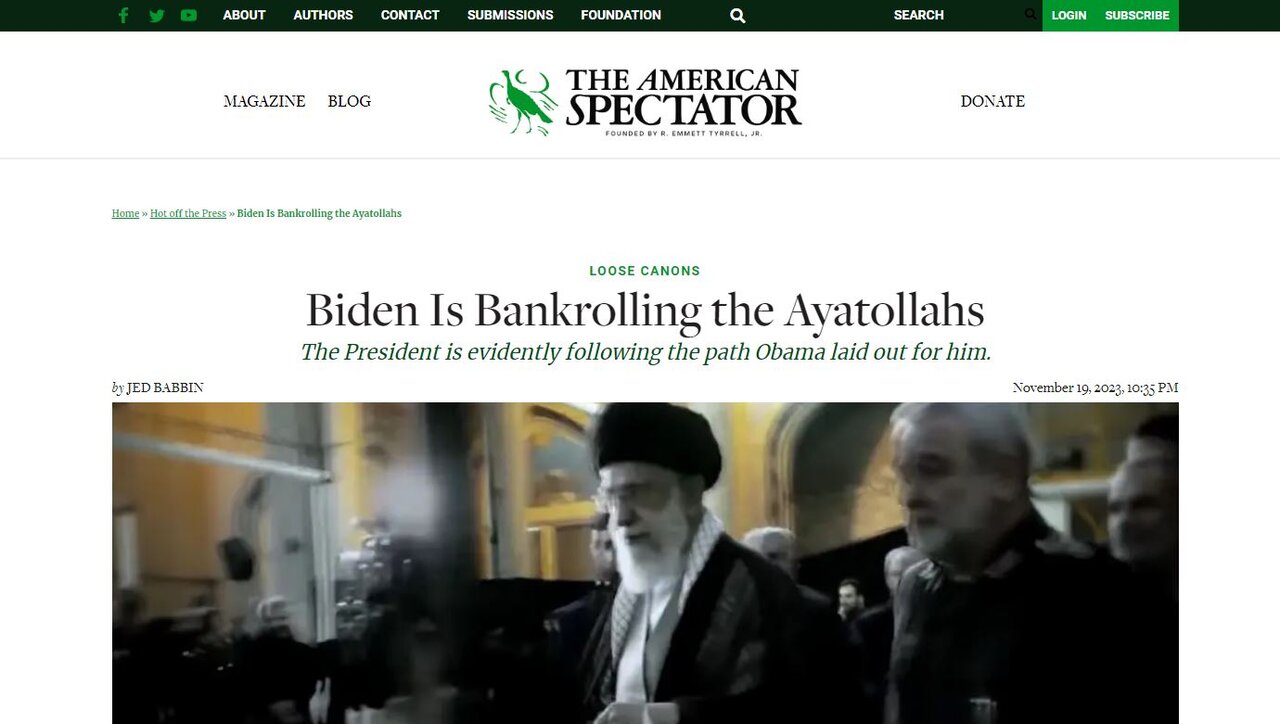The platitude of Iran-bashing media rhetoric

Tehran- The American Spectator publication published a story on November 19, aiming to portray Iran’s diplomatic relations and nuclear activities as a threat. However, every independent country has the right to pursue its national interests.
The author, Jed Babbin, claims that cooperation between Iran, China, and Russia is the “Axis of Evil,” which he claimed seems threatening to the U.S.
The conservative American magazine attempted to link Operation Al-Aqsa Storm to Iran and depict the country as the cause of the marginalized normalization talks between Tel Aviv and some Arab states.
Babbin pointed to an American sanctions waiver to Iran selling electricity to Iraq, which was granted in July and recently renewed.
Pointing to Tehran's access to its frozen assets, Babbin also stated that “who believes the Iranians will only buy food with the money is a fool.”
The author also claimed that Iran has continued to build its stockpile of 60 percent enriched uranium, which is a short step to the 90 percent weapons-grade material to demonize Tehran’s peaceful nuclear program.
However, the American publication’s argument can be countered with seven key points:
Diplomatic relations are based on national interests
The term ‘national interest’ has been used by statesmen and scholars since the founding of nation-states to describe aspirations and goals.
Although the author considers the Tehran-Beijing alliance to be dangerous, Washington has been one of the greatest trade partners to Beijing.
Since early 1979, the United States and China have initiated hundreds of joint research projects and cooperative programs under the Agreement on Cooperation in Science and Technology, the largest bilateral program.
The trade between the U.S. and China has ballooned in recent decades. This trade has benefited U.S. and Chinese consumers and companies, according to the Council on Foreign Relations.
China is one of the largest export markets for U.S. goods and services, and the United States is among the top export markets for China. This trade has helped the United States in the form of lower prices for consumers and higher profits for corporations, but it has also come with costs, said the American think tank on September 26, 2023.
Given the strong relationship between the U.S. and China, it should be noted that why Iran should not strengthen its ties with China.
The frozen asset are not ‘ransom’
Iran’s frozen funds, as it was insisted by the State Department recently, can only be spent with U.S. approval.
A senior State Department official said that the waiver "isn’t a free pass for all this money ($10 billion) to move," arguing it is a "layered" and "cumbersome" process.
The waiver allows the payments so long as they go through Oman, where a portion is converted to euros or other widely-traded currencies for Iran to buy non-sanctioned products such as humanitarian aid.
The point is that despite the statements by American officials and the Department of State with respect to Iran's frozen funds, Babbin claims that the unfreezing of the assets will be worrisome.
This is while the assets are Iran’s money, which has been illegally blocked by the U.S. bullying policy.
Iran ready to negotiate issues with IAEA
Despite the author’s claims that tend to tarnish Iran's nuclear program, the recent IAEA report, which was issued last week, does not provide evidence that Iran seeks to weaponize its nuclear plan.
As was stated by Iran’s Ambassador to Kuwait, Mohammad Toutounchi, on Monday, Iran expressed its desire to maintain constructive interaction with the International Atomic Energy Agency (IAEA).
“Tehran has extended an invitation to the Director General of the IAEA to address any remaining issues," said Toutounchi.
Israeli war crimes halt normalization talks
“Iran is also approaching Saudi Arabia to ensure it doesn’t accede to former president Trump’s Abraham Accords,” said Babbin, claiming that the Saudis' negotiation with Israel to join the Abraham Accord is “gone” because the Saudis won’t make any agreement with Israel.
Nevertheless, the main cause to halt the normalization process is the Israeli war crimes that are being continuously carried out in the besieged enclave.
Saudi officials, faced with global reactions to the Israeli barbarities in the Gaza Strip, seem to have come to second thoughts in relation to Riyadh-Tel Aviv normalization of relations.
The Saudi authorities may consider how the Arab states would react to Riyadh’s normalization of ties with Tel Aviv.
Not only Saudi Arabia but also many states are considering a boycott of Tel Aviv as their agenda in foreign policy.
Washington faithful backer of Tel Aviv
As part of an agreement reached under the Obama administration, Israel now receives $3.8 billion annually from the U.S. under a 10-year agreement that began in 2016.
Earlier in November, the U.S. House of Representatives passed a bill to provide $14.3 billion in aid to Israel.
The House bill would provide billions only for Israel's military, including $4 billion for the procurement of Israel's Iron Dome and David's Sling defense systems.
Biden had urged Congress to approve a broader $106 billion emergency spending package including funding for Israel as well.
As it seems, when it comes to backing Israel, it is Washington’s framework to pour the American taxpayers’ money into the Zionists’ pockets.
Biden or Babin, who knows better
Referring to Biden’s article in the Washington Post, Babbin expressed worries about why the U.S. president did not hold Iran accountable for the current developments in West Asia. So, a question is directed to Babbin “Who is well-informed about the ongoing issues in West Asia, you or Biden?”
